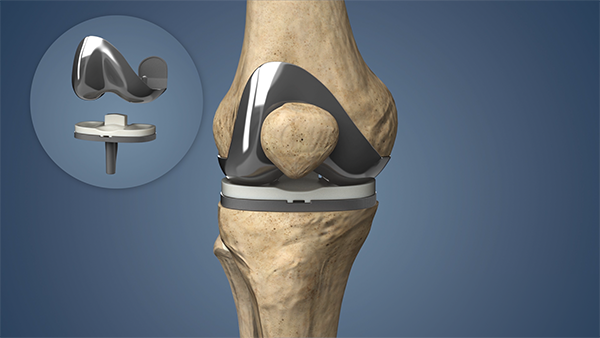Restoring Mobility and Reducing Pain
What Is Knee Replacement Surgery?
Knee replacement surgery, also known as knee arthroplasty, is a procedure designed to relieve pain and restore function in damaged or worn-out knee joints. It involves replacing the affected knee joint with a prosthetic implant, allowing smoother movement and improved quality of life. This surgery is commonly recommended for individuals suffering from severe arthritis or knee injuries that limit mobility and daily activities.
Knee replacement is a highly effective treatment for those experiencing persistent knee pain that does not respond to conservative treatments such as medication, physiotherapy, or lifestyle modifications.
Types of Knee Replacement Surgery
Unicompartmental (Partial) Knee Replacement
Unicompartmental knee replacement involves replacing only the damaged compartment of the knee, preserving healthy bone, cartilage, and ligaments. This less invasive option is suitable for patients with arthritis limited to one area of the knee. Benefits include a quicker recovery, less post-operative pain, and a more natural knee movement.
Total Knee Replacement
In total knee replacement, the entire knee joint is replaced with a prosthetic implant. This procedure is typically recommended for patients with extensive arthritis or joint damage affecting multiple compartments of the knee. It provides long-term relief from pain and improves overall function and mobility.
Revision or Complex Knee Replacement
Revision knee replacement is a more complex procedure performed when a previous knee replacement has failed due to infection, implant loosening, or wear and tear. This surgery involves replacing or repairing the existing implant and may require specialised components to restore knee function and stability.
Who Can Benefit from Knee Replacement Surgery?
Knee replacement may be suitable for individuals who:
- Suffer from severe osteoarthritis, rheumatoid arthritis, or post-traumatic arthritis.
- Experience persistent knee pain and stiffness that affects daily life.
- Have difficulty walking, climbing stairs, or performing routine activities.
- Have not found relief from non-surgical treatments like physiotherapy or medications.
Common Concerns About Knee Replacement Surgery
Is Knee Replacement Safe?
Yes. Knee replacement is a well-established procedure with a high success rate. Advances in surgical techniques and implant materials have made the procedure safer and more effective, significantly improving long-term outcomes for patients.
How Long Does Recovery Take?
The recovery process varies from patient to patient but generally includes:
- Hospital Stay – Most patients stay in the hospital for 2-3 days post-surgery.
- Early Rehabilitation – Walking with assistance begins within 24 hours after surgery.
- Physiotherapy & Strengthening – Ongoing physiotherapy helps regain strength and mobility over several weeks.
- Full Recovery – Most patients return to normal activities within 3-6 months, though complete healing may take up to a year.
Will I Experience Pain After Surgery?
Some discomfort is expected initially, but effective pain management, including medications and guided rehabilitation, helps reduce pain and ensure a smooth recovery.
What Are the Risks?
As with any surgical procedure, knee replacement carries some risks, including infection, blood clots, and implant wear over time. However, with proper post-surgical care and regular follow-ups, these risks are minimised.
How Does Knee Replacement Surgery Work?
- Pre-Surgical Assessment – A thorough evaluation, including imaging tests, is conducted to determine the extent of joint damage.
- Anaesthesia & Incision – The procedure is performed under anaesthesia, and an incision is made to access the knee joint.
- Damaged Tissue Removal – Worn-out cartilage and damaged bone are carefully removed.
Implant Placement – A prosthetic joint made from metal and plastic components is secured in place. - Wound Closure & Recovery – The incision is closed, and the patient is monitored before starting physiotherapy and rehabilitation.
Why Choose Advanced Orthopaedics for Knee Replacement?
Experienced Surgical Team
Led by Dr Sarbjit Singh, a Senior Consultant Orthopaedic Surgeon, our clinic provides a structured approach to knee replacement, ensuring precise treatment tailored to each patient’s condition.
Modern Prosthetic Implants
We use high-quality knee implants designed for durability and natural movement, enhancing long-term functionality and comfort.
Comprehensive Rehabilitation Support
Our post-surgical care includes guided physiotherapy, personalised recovery plans, and follow-up assessments to optimise healing and mobility.
Take the Next Step
If you are considering knee replacement surgery, our team at Advanced Orthopaedics is here to help. Schedule a consultation today to discuss your treatment options and take the first step towards pain-free movement and improved quality of life.





